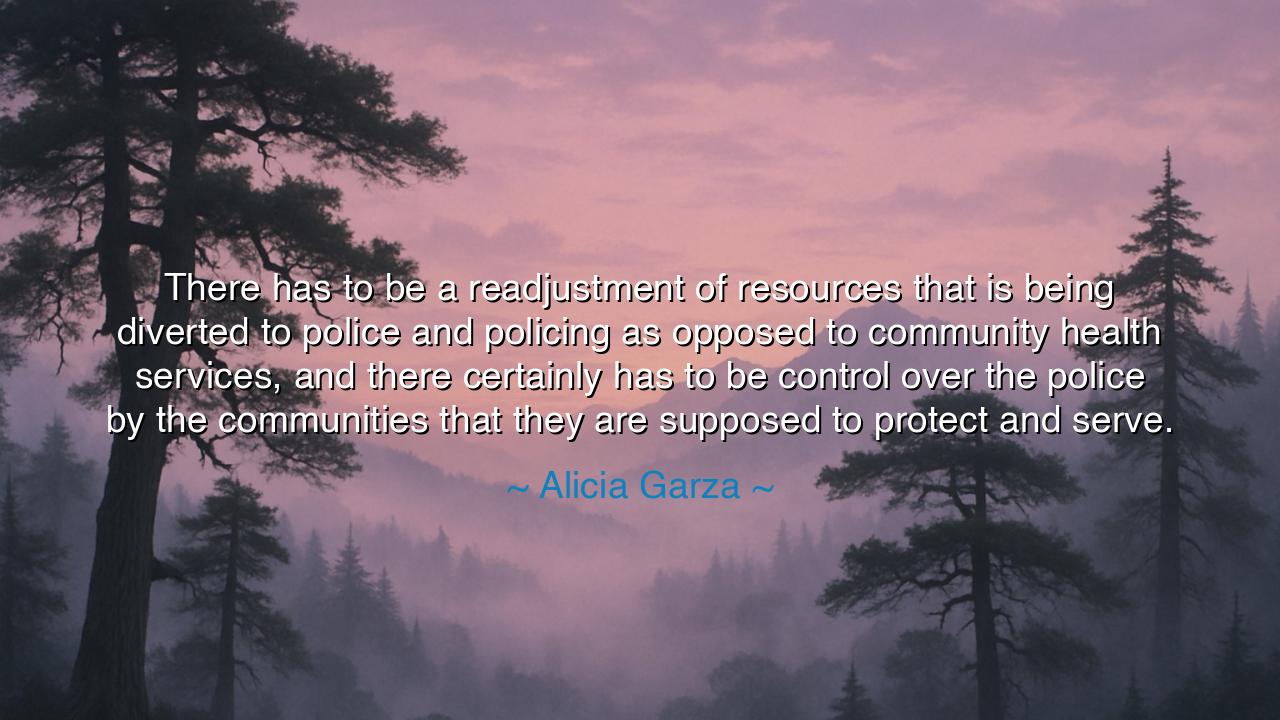
There has to be a readjustment of resources that is being
There has to be a readjustment of resources that is being diverted to police and policing as opposed to community health services, and there certainly has to be control over the police by the communities that they are supposed to protect and serve.






In an age when the cries of the people rise louder than the walls that contain them, Alicia Garza spoke words that cut through the fog of power and complacency: “There has to be a readjustment of resources that is being diverted to police and policing as opposed to community health services, and there certainly has to be control over the police by the communities that they are supposed to protect and serve.” Her words are not a mere call for reform—they are a plea for balance, a reminder that the sword of authority must never outweigh the scales of compassion. In them echoes the ancient truth that a civilization survives not by force, but by the well-being of its people.
Garza, a co-founder of the movement for Black Lives, speaks from the long lineage of those who have struggled against the corruption of justice and the misuse of power. Her call to readjust resources is a call to reawaken conscience: to remember that the strength of a nation lies not in its battalions, but in the health of its families, its neighborhoods, its children. For when wealth and will are poured endlessly into punishment, while the sick remain untreated and the poor unheard, a society begins to devour itself. The hand that claims to protect becomes the very hand that strikes.
This wisdom is not new. The ancients, too, saw how empires rotted from within when their rulers trusted the sword more than the heart. In the days of the Roman Republic, it was said that the city was kept safe not by legions, but by the virtue of its citizens. Yet as Rome grew rich and fearful, its leaders turned more and more toward military might to control its own people. The legions filled the streets, and the temples of learning and health were abandoned. The people became subjects, not citizens. And so Rome fell—not from invasion, but from the slow decay of compassion and trust.
So too, Garza warns of a similar danger in our own time. The police, who were created to serve and protect, have too often been armed to control and intimidate. The resources that could nourish the roots of peace—mental health care, education, addiction recovery, housing—are instead channeled into the machinery of enforcement. This imbalance is not merely economic; it is moral. For how can peace grow where fear is the soil? How can justice bloom when healing is starved?
Yet her words are not a condemnation of those in uniform—they are an invitation to transformation. To reallocate resources is not to weaken safety; it is to redefine it. True safety is not the silence that follows suppression, but the harmony that comes from meeting human needs. A community that is fed, cared for, and heard will police itself through love, not through fear. Garza envisions a world where control over the police rests with the people, where power flows upward from trust rather than downward from authority. This is not rebellion—it is restoration.
Consider the story of Martin Luther King Jr., who faced the brutality of police dogs and batons with the armor of truth. He taught that the arc of history bends toward justice only when men and women take up the patient work of peace. His marches were not against law and order, but against a system that mistook domination for safety. He dreamed, as Garza now dreams, of a nation where law enforcement serves not as master, but as guardian—a servant of the people, accountable to the people.
And so, from Garza’s call we inherit a sacred charge. We must look with clear eyes at where our treasures are stored, for “where your treasure is, there will your heart be also.” If our treasure lies in weapons and walls, our hearts will grow cold. But if it lies in community health, in education, in justice and care, our hearts will grow warm and strong. To the leaders of the present and the builders of the future: let your budgets reflect your values, and let your values be rooted in compassion.
Therefore, remember this teaching: peace is not purchased by power, but by presence. A society that tends to the body of its people—their wounds, their fears, their hopes—needs fewer guards at its gates. Heed Alicia Garza’s wisdom: shift the resources, return the power, restore the balance. For when the people are well, the city will stand; when the people are healed, the streets will rest. And then, at last, the words “to protect and serve” will no longer be a promise broken, but a truth fulfilled.






AAdministratorAdministrator
Welcome, honored guests. Please leave a comment, we will respond soon